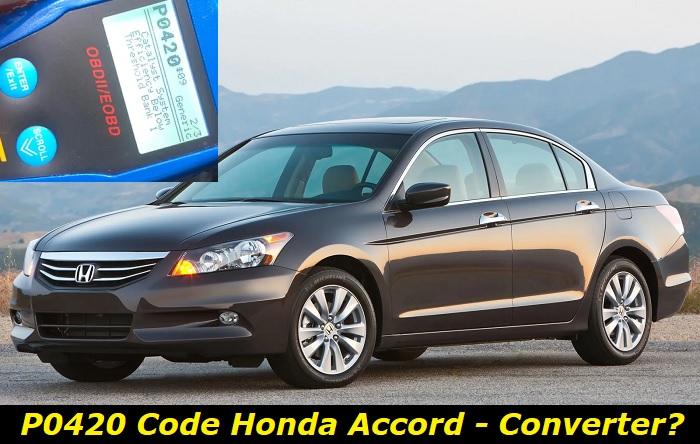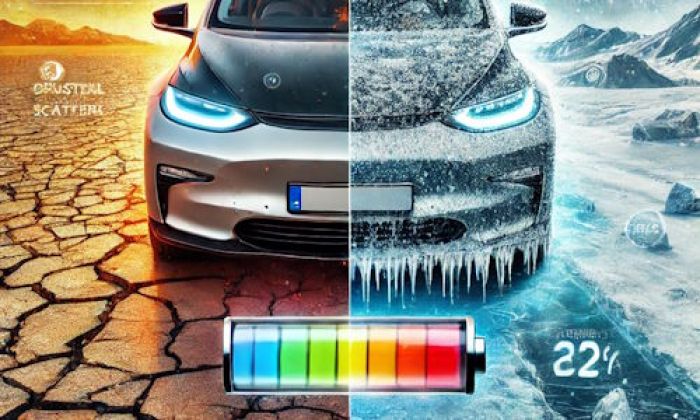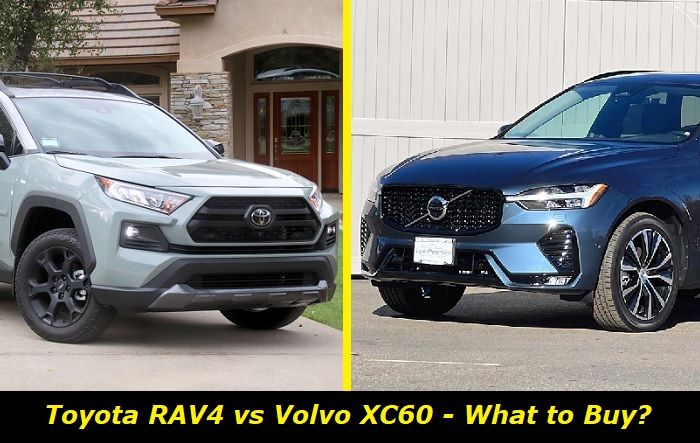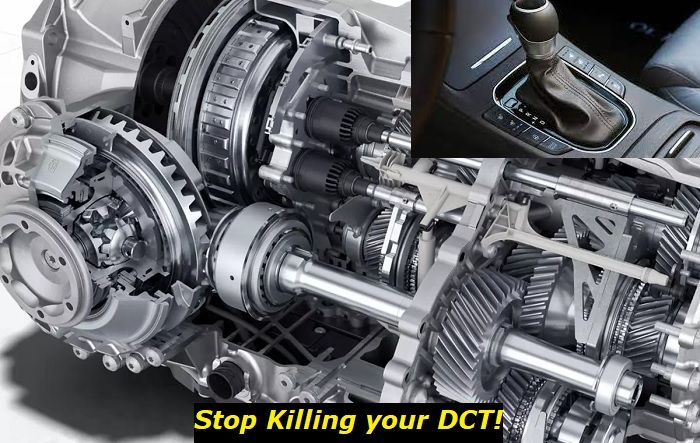If you're the owner of a Honda Accord and you see the P0420 code on your dash, don't panic just quite yet. It doesn't mean that your car is doomed or anything. In this post, we'll discuss what this code means and what you can do to fix it. So keep reading if you want to find out more about the P0420 code!
P0420 code highlights
- Level of urgency:Medium
- Possible culprits:catalytic converter, exhaust pipe
- Price for repair:$500 - $1,500
- If neglected:Engine stalling, power loss, failing emission tests
- DIY repairs:Impossible
- Can you drive?Yes

What is a catalytic converter?
A catalytic converter is an important part of your car's exhaust system, and it helps to keep the air clean. The converter is a small device that is located between the engine and the muffler. It contains a metal catalyst, which helps to convert harmful chemicals (carbon monoxide, hydrocarbons, and nitrogen oxides) into less harmful ones.
The converter helps to reduce the amount of pollution that your car emits, and it is required by law in many states. Without the catalytic converter, your car would produce much more pollution. So, next time you take a look under your hood, be sure to thank your catalytic converter for helping to keep the air clean!
The Honda Accord P0420 code - what does it mean?
The P0420 code is one of the most common codes thrown by Honda Accords. It's also one of the most misunderstood. Simply put, the P0420 code means that the Accord's catalytic converter is not working as efficiently as it should be.
When the converter is not functioning properly, it can lead to increased emissions and decreased fuel economy. In some cases, the converter may need to be replaced. However, oftentimes the problem can be resolved with a simple tune-up or repairs to the Accord's oxygen sensor.
Regardless of the cause, it's important to have the P0420 code diagnosed and repaired as early as possible to prevent more damage to the Accord's emission control system.
What causes the failure of the catalytic converter?
Over time, catalytic converters can become clogged or damaged, which can lead to increased emissions. There are a number of reasons why this can happen.
- Age and mileage
There are two main factors that contribute to catalytic converter failure: age and mileage. Over time, soot and other deposits can clog the catalytic converter, which will prevent it from operating effectively.
In addition, the converter can also be damaged by corrosion or physical damage. As a result, it's important to have the converter regularly inspected to ensure that it's in good working condition.
With proper maintenance, the catalytic converter can last for many years. However, there will come a time when it will need to be replaced.
- Exposure to leaded gasoline
It's no secret that leaded gasoline is bad for your car's engine. In fact, it's one of the main causes of catalytic converter failure. When lead is present, it can poison the catalyst, causing it to lose its effectiveness.
As a result, the converter is unable to properly clean the exhaust, leading to increased emissions of harmful gases. So if you want to keep your catalytic converter in good working order, it's best to avoid leaded gasoline altogether.
- Engine misfires
If your catalytic converter has failed, there's a good chance it's because your engine has been misfiring. The catalytic converter can only do its job properly if the engine is running smoothly.
When the engine misfires, it sends unburned fuel into the exhaust system. This unburned fuel can overheat the catalytic converter, causing it to fail. In addition, a misfiring engine can also cause damage to the oxygen sensors.
The main purpose of these sensors is to keep track of the air/fuel mixture in the engine. If they are damaged, the engine will run lean, which can also lead to a catalytic converter failure.
Whatever the cause, a failed catalytic converter can be a serious problem. Fortunately, most modern cars are equipped with a "check engine" light that comes on when the converter isn't working properly.
Common symptoms of a bad or failing catalytic converter
If your car is starting to feel a little sluggish, it might be time to check the catalytic converter. When this component isn't functioning properly, it can cause all sorts of problems. Here are some common symptoms of a bad or failing catalytic converter:
- Your car is hard to start or stalls frequently
If your car is giving you trouble starting up, or if it's stalling more often than usual, there's a chance that your catalytic converter has failed. When it fails, you'll notice a decrease in performance.
- Your car has reduced power and acceleration
If your car suddenly has reduced power and acceleration, it may be due to a catalytic converter failure. In most cases, this issue manifests as a decrease in low-end torque. Such failure can occur when the converter becomes clogged or damaged, preventing it from doing its job properly.
In some cases, a simple repair may be all that is needed to fix the problem. In other cases, the entire catalytic converter will need to be replaced.
- Your car is smoking from the tailpipe
In ideal conditions, the exhaust gases should be invisible. If your car is emitting dark exhaust fumes from the tailpipe, it could be a sign of catalytic converter failure. When the converter fails, it cannot filter harmful emissions generated by the engine, which results in dark smoke.
- Your car has an unusually high fuel consumption
Due to the failure of the catalytic converter, your car may need to use more fuel to start and run.
- The check engine light is on
If you're like most people, the sight of your check engine light on your dashboard is enough to send you into a panic. After all, it could be any number of things - and none of them good. One potential problem is the failure of your catalytic converter.
The good news is that there are some tell-tale signs that your converter is failing. For example, you may notice that your engine is running hotter than usual or that you're experiencing decreased fuel economy.
If you're experiencing any of these problems, it's time to take your car to a mechanic for a checkup. The sooner you catch the problem, the better chance you have to avoid costly repairs.
How to fix the catalytic converter on a Honda Accord?
If you're the owner of a Honda Accord, you may eventually have to deal with a faulty catalytic converter. Luckily, there are a few things you can do to fix the issue. First, check the oxygen sensor. If it's faulty, it can cause the catalytic converter to overheat.
Next, clean the spark plugs and replace them if necessary. A build-up of debris can also cause problems. Finally, have the engine computer scanned for codes. This will help you identify any other issues that may be contributing to the problem.
With a little effort, you should be able to get your catalytic converter back in working order.
How much will it cost to replace the catalytic converter on a Honda Accord?
You may be wondering how much it will cost to replace the catalytic converter. Unfortunately, there's no easy answer as the cost can vary depending on a number of factors. However, we can give you a rough estimate.
Based on our research, the cost of a catalytic converter replacement for a Honda Accord ranges from $500 to $1,500. Of course, this is just an estimate, and your actual costs may be higher or lower depending on your specific vehicle and situation. So if you're in need of a new catalytic converter, be sure to get a few quotes before making a decision.
Alternatives to replacing the catalytic converter on your Honda Accord
If your Honda Accord is due for a new catalytic converter, you might be wondering if there are any alternatives to replacement. After all, those things can be pretty expensive. Luckily, there are a few things you can try before resorting to shelling out for a new converter.
First, check your engine light. If it's on, that could be an indication that something else is going on with your car that's causing the converter to run less efficiently. You might also want to try using higher-octane gasoline or changing your oil more frequently.
If neither of those things seems to be making a difference, then it might be time to bite the bullet and get a new catalytic converter. But at least you can say you tried!
Conclusion
The Honda Accord catalytic converter P0420 code is a common issue that can occur in this car. It's important to know the symptoms of a bad or failing catalytic converter so you can get it fixed as soon as possible.
Thankfully, repairing the catalytic converter on a Honda Accord isn't too difficult and can be done by a qualified mechanic very quickly. In more complex cases, you may need to replace the entire converter, which is a much costlier option.
Have you ever had to fix your car's catalytic converter? What was the process like? Let us know in the comments below.
About the authors
The CarAraC research team is composed of seasoned auto mechanics and automotive industry professionals, including individuals with advanced degrees and certifications in their field. Our team members boast prestigious credentials, reflecting their extensive knowledge and skills. These qualifications include: IMI: Institute of the Motor Industry, ASE-Certified Master Automobile Technicians; Coventry University, Graduate of MA in Automotive Journalism; Politecnico di Torino, Italy, MS Automotive Engineering; Ss. Cyril and Methodius University in Skopje, Mechanical University in Skopje; TOC Automotive College; DHA Suffa University, Department of Mechanical Engineering






Add comment